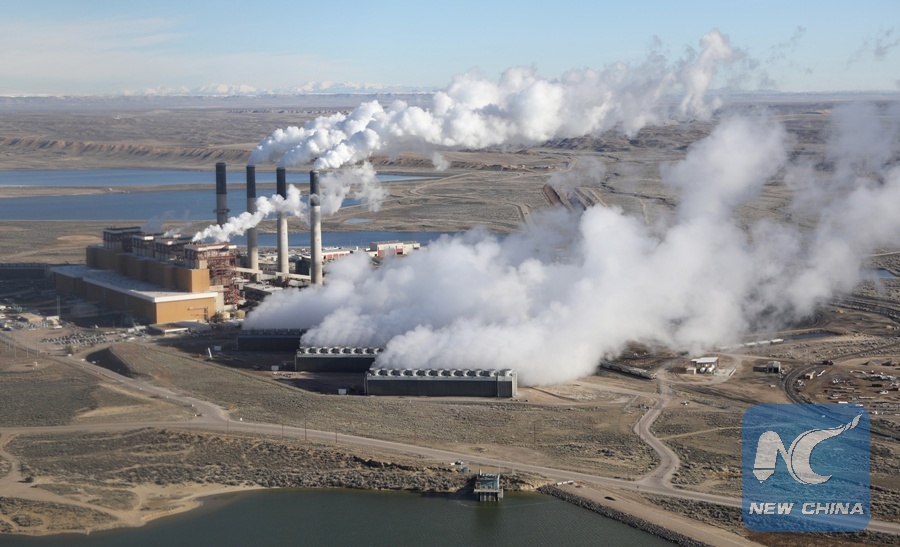
Steam rises from the coal-fired Jim Bridger power plant outside Rock Springs, Wyoming, U.S. April 5, 2017. (Xinhua/REUTERS)
WASHINGTON, Oct. 10 (Xinhua) -- The U.S. Environmental Protection Agency (EPA) took a formal step on Tuesday to repeal measures put in place by former U.S. President Barack Obama that would limit greenhouse gas emissions from existing power plants.
EPA Administrator Scott Pruitt issued a notice of proposed rulemaking, proposing to repeal the so-called Clean Power Plan because it "exceeds the agency's statutory authority."
"We are committed to righting the wrongs of the Obama administration by cleaning the regulatory slate," Pruitt said in a statement.
"Any replacement rule will be done carefully, properly, and with humility, by listening to all those affected by the rule," he said.
The EPA has sent the notice to the Federal Register for publication and the public will now have 60 days to submit comments.
It's an unastonishing move because President Donald Trump, who once called climate change a "hoax," has already announced in June that his country will leave the Paris Agreement on curbing global warming.
His administration considered efforts to fight climate change just to "be a waste of your money," a position met with widespread criticism both at home and abroad.
The Clean Power Plan, issued by the Obama administration in 2015, required coal-fired power plants to reduce carbon dioxide emissions by 32 percent from 2005 levels by 2030, but it was put on hold by the U.S. Supreme Court in a five to four decision in February 2016.
In March this year, Trump signed an executive order, directing the EPA to "suspend, revise, or rescind" the Obama-era regulation.
The agency said Tuesday that repealing the plan will "facilitate the development of U.S. energy resources and reduce unnecessary regulatory burdens associated with the development of those resources."
More specifically, the Trump administration claimed that the proposed repeal could provide up to 33 billion U.S. dollars in avoided compliance costs in 2030.
Gina McCarthy, the EPA administrator under Obama who released the Clean Power Plan, however, said in a statement that a proposal to repeal it "without any timeline or even a commitment to propose a rule to reduce carbon pollution, isn't a step forward."
"The (current) administration is using contrived problems with our energy system to take money out of consumers' pockets and giving it to fossil fuel companies, so they can force a shift away from clean energy and back to dirty fossil fuel," she said.
Reaction to the proposed repeal was deeply divided, with industry groups welcoming it, and environmental groups decrying the move.
Jim Matheson, chief executive officer of the National Rural Electric Cooperative Association, cheered it as a "first step" toward replacing the plan with "a common-sense regulatory framework" that provides "much-needed flexibility and certainty" to meet their members' energy needs.
Jay Timmons, president and CEO of the National Association of Manufacturers, said in a statement that the Trump administration has "made the right decision" and "manufacturing workers can feel a tremendous sense of relief today."
Sam Adams, U.S. director of the World Resources Institute and former mayor of Portland, Oregon, however, wrote in a blog that this move flies in the face of common sense and that it will hurt America's security and economy.
"It also won't bring back lost jobs in the coal industry, and instead, pours cold water on the country's shift to renewable energy," Adams said. "Rolling it back won't move the country forward -- it will sadly just leave the country with a fuzzier roadmap for the future."
Experts said that it's unlikely the U.S. will see any immediate effects from rolling back the plan, but undoubtedly, it will slow the country's transition from coal power to natural gas, wind and solar.
Many U.S. states, cities and companies have pledged to work to reduce emissions without Washington, but it's unclear if this will be enough.
Attorneys general of multiple states like New York vowed to sue the Trump administration.
The EPA determined in 2009 that carbon dioxide constitutes a pollutant under the country's Clean Air Act, so the agency is required to act to regulate emissions.
"Fuel-burning power plants are one of our nation's largest sources of climate change pollution, and common-sense science -- and the law -- dictate that EPA take action to cut these emissions," New York Attorney General Eric Schneiderman said in a statement.
"The Trump administration's persistent and indefensible denial of climate change -- and their continued assault on actions essential to stemming its increasing devastation -- is reprehensible, and I will use every available legal tool to fight their dangerous agenda," Schneiderman said.

